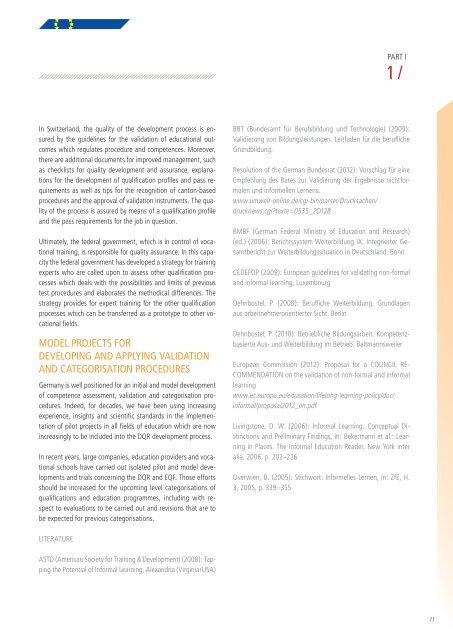RECOGNITION OF NON-FORMAL AND INFORMAL ... - Solidar
RECOGNITION OF NON-FORMAL AND INFORMAL ... - Solidar
RECOGNITION OF NON-FORMAL AND INFORMAL ... - Solidar
Create successful ePaper yourself
Turn your PDF publications into a flip-book with our unique Google optimized e-Paper software.
PART I<br />
1 /<br />
In Switzerland, the quality of the development process is ensured<br />
by the guidelines for the validation of educational outcomes<br />
which regulates procedure and competences. Moreover,<br />
there are additional documents for improved management, such<br />
as checklists for quality development and assurance, explanations<br />
for the development of qualifi cation profi les and pass requirements<br />
as well as tips for the recognition of canton-based<br />
procedures and the approval of validation instruments. The quality<br />
of the process is assured by means of a qualifi cation profi le<br />
and the pass requirements for the job in question.<br />
Ultimately, the federal government, which is in control of vocational<br />
training, is responsible for quality assurance. In this capacity<br />
the federal government has developed a strategy for training<br />
experts who are called upon to assess other qualifi cation processes<br />
which deals with the possibilities and limits of previous<br />
test procedures and elaborates the methodical differences. The<br />
strategy provides for expert training for the other qualifi cation<br />
processes which can be transferred as a prototype to other vocational<br />
fi elds.<br />
MODEL PROJECTS FOR<br />
DEVELOPING <strong>AND</strong> APPLYING VALIDATION<br />
<strong>AND</strong> CATEGORISATION PROCEDURES<br />
Germany is well positioned for an initial and model development<br />
of competence assessment, validation and categorisation procedures.<br />
Indeed, for decades, we have been using increasing<br />
experience, insights and scientifi c standards in the implementation<br />
of pilot projects in all fi elds of education which are now<br />
increasingly to be included into the DQR development process.<br />
In recent years, large companies, education providers and vocational<br />
schools have carried out isolated pilot and model developments<br />
and trials concerning the DQR and EQF. Those efforts<br />
should be increased for the upcoming level categorisations of<br />
qualifi cations and education programmes, including with respect<br />
to evaluations to be carried out and revisions that are to<br />
be expected for previous categorisations.<br />
BBT (Bundesamt für Berufsbildung und Technologie) (2009):<br />
Validierung von Bildungsleistungen. Leitfaden für die berufl iche<br />
Grundbildung.<br />
Resolution of the German Bundesrat (2012): Vorschlag für eine<br />
Empfehlung des Rates zur Validierung der Ergebnisse nichtformalen<br />
und informellen Lernens.<br />
www.umwelt-online.de/cgi-bin/parser/Drucksachen/<br />
drucknews.cgi?texte=0535_2D12B<br />
BMBF (German Federal Ministry of Education and Research)<br />
(ed.) (2006): Berichtssystem Weiterbildung IX. Integrierter Gesamtbericht<br />
zur Weiterbildungssituation in Deutschland, Bonn<br />
CEDEFOP (2009): European guidelines for validating non-formal<br />
and informal learning, Luxembourg<br />
Dehnbostel, P. (2008): Berufl iche Weiterbildung. Grundlagen<br />
aus arbeitnehmerorientierter Sicht. Berlin<br />
Dehnbostel, P. (2010): Betriebliche Bildungsarbeit. Kompetenzbasierte<br />
Aus- und Weiterbildung im Betrieb. Baltmannsweiler<br />
European Commission (2012): Proposal for a COUNCIL RE-<br />
COMMENDATION on the validation of non-formal and informal<br />
learning<br />
www.ec.europa.eu/education/lifelong-learning-policy/doc/<br />
informal/proposal2012_en.pdf<br />
Livingstone, D. W. (2006): Informal Learning: Conceptual Distinctions<br />
and Preliminary Findings, in: Bekermann et al.: Learning<br />
in Places. The Informal Education Reader, New York inter<br />
alia, 2006, p. 202–226<br />
Overwien, B. (2005): Stichwort: Informelles Lernen, in: ZfE, H.<br />
3, 2005, p. 339–355<br />
LITERATURE<br />
ASTD (American Society for Training & Development) (2008): Tapping<br />
the Potential of Informal Learning, Alexandria (Virginia/USA)<br />
11
















